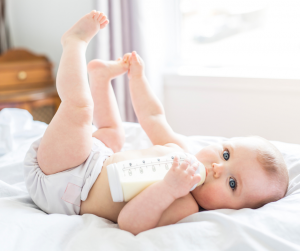
When you enter parenthood everyone always says that all your clothes will be covered in spit-up, but beyond that, not many tell you why or how to handle it AND try to get sleep too!
As a nurse practitioner in sleep medicine, reflux was absolutely one of the number one things that can worsen sleep! In today’s blog, I’ll be discussing what is reflux, what the safe sleep recommendations are, reflux tips, and when to seek help for treatment.
What is reflux?
Gastroesophageal reflux (GER) occurs when food and acid in your baby’s stomach come back up into the esophagus. Now this is basically the norm of all infants due to the anatomy of the esophagus and then GER typically gets much better after 6 months once a baby learns to sit up; the esophagus gets longer and the lower esophageal sphincter functions properly.
Therefore keep in mind that spitting in itself is very normal, but it’s more likely to be an issue and be diagnosed as Gastroesophageal reflux disease (GERD) if your baby is
- Coughing, choking or gagging
- Fussiness during or after feeding
- Arching away from bottle/nipple
- Has difficult sleeping
- Nasal congestion or noisy breathing occurring soon after or during eating
Also when a baby has reflux, fussy behavior usually occurs all day, rather than just in the evening.
Back to Sleep
The most important thing for parents to know is that placing your baby in a semi-inclined position does not make reflux better. This was used as a tool years ago and evidence now shows us that sleeping in these inclined sleepers can lead to an increased risk of suffocation and strangulation. In addition, there is evidence that a semi-inclined position can make a baby’s reflux worse.
Though parents are often concerned that their baby may vomit and choke while sleeping on their back, it is a total myth! Babies automatically cough up or swallow fluid that they spit up or vomit because of the gag reflex, which naturally prevents choking from happening (AAP, 11/30/2021).
The most important thing for parents to know is that placing your baby in a semi-inclined position does not make reflux better.
AAP

Tips to help with GER
For developmentally normal spitting and mild GER, the following tips can help!
- Hold your baby in upright position during bottle feeding or the upright or koala hold for breastfeeding. Continue to keep your baby upright after feeding up to one hour.
- Baby wearing can be helpful for daytime naps after feeds and take turns with your partner for holding baby upright overnight after feedings (do not fall asleep holding baby in bed or chair).
- Overfeeding can aggravate reflux. Try smaller volume with more frequent feeding sessions.
- Frequently burp your baby your baby for a few minutes during feeding.
- Avoid tight fitting clothing around your baby’s tummy (including tight swaddle).
- Handle your baby gently and try to refrain from jiggling or bathing within the first hour after a meal.
- Dream feeds can occasionally be helpful during infant sleep, but would NOT be recommended for a baby with GER symptoms.
As a reminder this content is all helpful information and tips to help your baby sleep better, but does not replace medical advice. If you child’s GER is not improving please contact your child’s care provider to discuss other medical treatment options.

References:
Back to sleep: https://www.healthychildren.org/English/tips-tools/ask-the-pediatrician/Pages/What-is-the-safest-sleep-solution-for-my-baby-with-reflux.aspx
Tips for GER: https://riseandshine.childrensnational.org/the-ultimate-baby-reflux-survival-guide/

